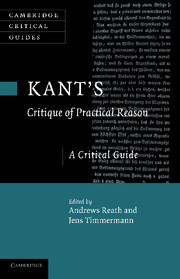Book contents
- Frontmatter
- Contents
- Preface
- List of contributors
- Translations and abbreviations
- Introduction
- 1 The origin and aim of Kant's Critique of Practical Reason
- 2 Formal principles and the form of a law
- 3 Moral consciousness and the ‘fact of reason’
- 4 Reversal or retreat? Kant's deductions of freedom and morality
- 5 The Triebfeder of pure practical reason
- 6 Two conceptions of compatibilism in the Critical Elucidation
- 7 The Antinomy of Practical Reason: reason, the unconditioned and the highest good
- 8 The primacy of practical reason and the idea of a practical postulate
- 9 The meaning of the Critique of Practical Reason for moral beings: the Doctrine of Method of Pure Practical Reason
- Bibliography
- Index
8 - The primacy of practical reason and the idea of a practical postulate
Published online by Cambridge University Press: 06 August 2010
- Frontmatter
- Contents
- Preface
- List of contributors
- Translations and abbreviations
- Introduction
- 1 The origin and aim of Kant's Critique of Practical Reason
- 2 Formal principles and the form of a law
- 3 Moral consciousness and the ‘fact of reason’
- 4 Reversal or retreat? Kant's deductions of freedom and morality
- 5 The Triebfeder of pure practical reason
- 6 Two conceptions of compatibilism in the Critical Elucidation
- 7 The Antinomy of Practical Reason: reason, the unconditioned and the highest good
- 8 The primacy of practical reason and the idea of a practical postulate
- 9 The meaning of the Critique of Practical Reason for moral beings: the Doctrine of Method of Pure Practical Reason
- Bibliography
- Index
Summary
INTRODUCTION: RATIONAL BELIEF WITHOUT THEORETICAL EVIDENCE
Peter is secretly in love with his colleague Mary but too shy to disclose his feelings to her. Mary is nice enough to Peter, but never has she given any indication that her feelings for him go beyond those for a colleague and friend. Nevertheless, Peter firmly believes that Mary is in love with him, too. Most people would agree with Kant's contemporary Wizenmann (on whose objection to Kant the example is based) that Peter's belief is irrational. But why is it? A possible answer might be that the fact that one wishes something to be the case in itself is no evidence for its being the case. This is the answer given by Wizenmann: ‘reasons [for a belief] that do not bear at all on the credibility of a thing do not determine anything with respect to its very credibility’; therefore, according to Wizenmann, a belief like Peter's is not ‘rational’ (vernünftig). In order for this answer to work, however, we must presuppose that for a belief to be rational, the subject needs sufficient evidence in favour of its truth (‘reasons’ that bear on the ‘credibility’ of the belief). In Peter's case, no such evidence is available; hence, his belief is irrational.
Keywords
- Type
- Chapter
- Information
- Kant's 'Critique of Practical Reason'A Critical Guide, pp. 168 - 196Publisher: Cambridge University PressPrint publication year: 2010
- 22
- Cited by



